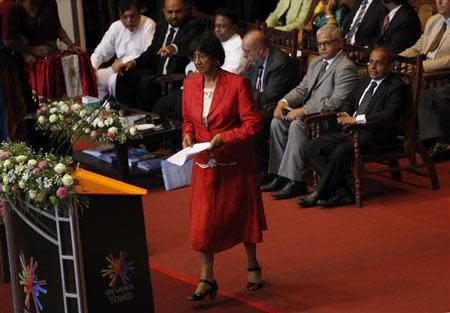Sri Lankans think U.N. is biased, president tells rights chief

By Shihar Aneez and Ranga Sirilal COLOMBO (Reuters) - Sri Lankan President Mahinda Rajapaksa told the United Nations human rights chief on Friday that his people believe the U.N. is a biased organization, and a report she is due to release next month has already prejudged the country. Rajapaksa met U.N. High Commissioner for Human Rights Navi Pillay near the end of her week-long visit to Sri Lanka, where the government fought separatist Tamil guerrillas in a 26-year civil war before finally defeating them in 2009. A U.N. panel has said it has "credible allegations" that both sides committed atrocities and war crimes, and singled out the government for most of the blame. "President Rajapaksa told Pillay that the people of the country believe the United Nations is a biased organization," his office said in a statement. "They believe that your report has already prejudged (Sri Lanka)," it quoted him as saying. Pillay, who has seen demonstrations for and against her mission, will give a news conference in Colombo on Saturday. She has met a wide range of people including fishermen, religious leaders, activists from non-government organizations, media, opposition members and ethnic minority Tamils in former war zones. Her visit followed a second U.S.-sponsored U.N. resolution in March this year that urged Sri Lanka to carry out credible investigations into killings and disappearances during the civil war, especially in the final stages. Rajapaksa's comments came a day after a government minister accused Pillay of acting without transparency in evaluating the country four years after the end of its civil war and said her report would be unfair. She will submit a summary report on Sri Lanka during a session of the U.N. Human Rights Council in September, and a more detailed report in March next year. On Friday, a hundreds of people demonstrated near the U.N. head office in Colombo demanding Pillay look into all human rights violations in the nearly three-decade war, including disappearances of soldiers, instead of only examining the last few months of the conflict. A U.N. panel has said tens of thousands of civilians were killed in the final months as government troops advanced on the rebels' last stronghold. Many hundreds of people, most of them Tamils, simply disappeared. Sri Lanka has come under international pressure to bring to book those accused of war crimes and boost efforts to reconcile a polarized country. It has rejected the accusations of rights abuses, but Rajapaksa last month ordered an inquiry into mass disappearances. (Writing by Shihar Aneez; Editing by Mark Trevelyan)
